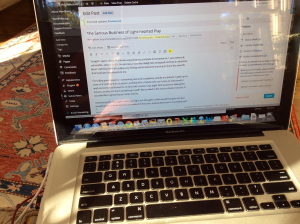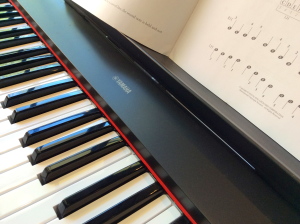Last night I spent 45 minutes exposing my complete incompetence. I was awkward, vulnerable, slow — and in the process, I was also delighted, energized and had an absolute blast! I left that time of inadequacy feeling exhilarated and wanting to share the new life that had been breathed into me.
It’s all about child’s play. Stay with me to see how playing is necessary and life giving!
 I’m taking piano lessons — something new and completely outside my skill set. I grew up as more of a tomboy than musician, and like most adults who can’t play an instrument, I wish someone had forced me to stick with it when I was eight. Rob wanted to take guitar lessons, so why not learn something new myself? We enrolled in the music school at church. It sounded like a great empty nester activity.
I’m taking piano lessons — something new and completely outside my skill set. I grew up as more of a tomboy than musician, and like most adults who can’t play an instrument, I wish someone had forced me to stick with it when I was eight. Rob wanted to take guitar lessons, so why not learn something new myself? We enrolled in the music school at church. It sounded like a great empty nester activity.
I showed up the first night without giving much thought to what would transpire or how I would feel as a novice. As soon as I walked in the room, self-consciousness enveloped me. When he asked me to play something I knew, my mind went blank and I froze.
I’m every bit a beginner — like a little child, but different in one big way: the adult expectations I place on myself. I’m tense and impatient with my fumbling fingers. I know enough to recognize every wrong note. My adult expectations are an impediment to my learning and enjoyment. Negative self-talk abounds: “Wrong note! That didn’t sound right. I’m so bad at this… will I ever learn?” Adults aren’t used to being in situations where we’re inept: bungling, amateurish, and incapable.
My teacher, Steven is patient, encouraging and accepting. I arrive for lessons with anxiety, but he helps me to relax and enjoy music.
Tonight was my third lesson, and I was exhausted. Fatigue distracted me just driving to my lesson… you can imagine how poorly I was making music. Still, Steven said I looked (not sounded) more like a pianist. I didn’t really get it, but I was childishly giddy at my supposed progress — and felt a little life.
Possibly because I was struggling to translate the music into any obedience from my fingers, we practiced scales. I tried to relax my wrists between chords, as suggested. Funny how tense my whole body was; I was even holding my breath. I was pathetic. Literally, I couldn’t press three keys at the same time. We remediated my exercises a bit…
Maybe it was a God-thing when Steven related learning the piano to sports… something clicked for me.

More than raw athleticism or good form, my mind game was my strong suit in tennis and basketball. By that I mean my ability to stay positive — to shake off my mistakes and have fun no matter what — often helped me succeed against more talented competitors.
I began playing both sports at a very young age — before I had many expectations for myself. Play was about fun. Relaxing, full of wonder, creativity, experimentation, and laughter. I shot baskets in the back yard and hit balls against the garage wall for hours. It fed my imagination with possibilities and my soul with life.
Concepts like work, practice and mastery weren’t a part. I was a little girl just playing, consumed in the present moment. Unselfconscious and excited with each little success. I created games around what I COULD do — and I always “won.” Curiosity and experimentation were just part of the game. I was a sponge for learning new thing and free to enjoy the whole process.
 Can I bring those beautiful, childish qualities to my adult piano practice? I think so! Learning piano is a humbling reminder of my limitations — a great place to find enjoyment and identity NOT in what I accomplish, but in being myself with God and his creation (in this case, music). This shift in attitude would be fun, and perfectly in line with my true goal: I just want to “perform” praise songs and 70s rock when I’m home alone!
Can I bring those beautiful, childish qualities to my adult piano practice? I think so! Learning piano is a humbling reminder of my limitations — a great place to find enjoyment and identity NOT in what I accomplish, but in being myself with God and his creation (in this case, music). This shift in attitude would be fun, and perfectly in line with my true goal: I just want to “perform” praise songs and 70s rock when I’m home alone!
Hmmm. I think the application could be even broader. Could the experience of exposing my incompetence while having a blast in piano lessons help me to live all of my life more like a little child? Is it healthy to playfully display our vulnerabilities and weaknesses? To not take ourselves so seriously? Maybe so. I think this piano lesson mentality could grow into an attitude and lifestyle.
In Matthew 10:15 Jesus says “Truly I tell you, anyone who will not receive the kingdom of God like a little child will never enter it.” It becomes clear to those listening to Jesus that heaven is not gained by human achievement or merit; it must be received as God’s gift through the simple trust of those who acknowledge their own inability, and accept His gift of salvation. Could the same be true of receiving abundant life?
 The Bible describes us as children of God. As such, doesn’t it make sense that we should possess many qualities common to young children? Not those derived from immaturity, but rather those that reflect our dependence, wonder, humility, vulnerability, and receptiveness? Maybe one of the things He had in mind was that we, who are distracted by many important things, must rediscover a childlike capacity to play?
The Bible describes us as children of God. As such, doesn’t it make sense that we should possess many qualities common to young children? Not those derived from immaturity, but rather those that reflect our dependence, wonder, humility, vulnerability, and receptiveness? Maybe one of the things He had in mind was that we, who are distracted by many important things, must rediscover a childlike capacity to play?
In all our focus on productivity and seriousness (including much of our “play”), we’ve made life rather dull. God is not boring! Rediscovering playfulness, which ultimately comes in union with Christ, puts the fullness of life back in our living. “Wasting time” doing things for the sheer fun of it restores our souls. Isn’t it possible that God means for “recreation” to re-create and renew us?
 Laughter, fun and light-hearted play remind us to be fully engaged, but not to take the work of our present day with ultimate seriousness. It’s not a call to irresponsibility or a slacker mentality, rather a reminder that God’s future, which is also part of our present, is most serious. God is in control and working all things for good according to His plan. Our work is central, but it is a subset within the BIG picture. A play-ethic is a good counterbalance to our work-ethic.
Laughter, fun and light-hearted play remind us to be fully engaged, but not to take the work of our present day with ultimate seriousness. It’s not a call to irresponsibility or a slacker mentality, rather a reminder that God’s future, which is also part of our present, is most serious. God is in control and working all things for good according to His plan. Our work is central, but it is a subset within the BIG picture. A play-ethic is a good counterbalance to our work-ethic.
It seems to me that play was an original and important part of the fourth commandment to Sabbath rest. Developing a Sabbath heart has the added benefit of bringing an attitude of playfulness to all of life and work. Our willingness to accept the play, rest and refreshment that Jesus offers is a sign of our faithfulness and trust in Him.
 It works like magic, when I sit at that rickety bench for my piano lessons. The world’s obligations melt away. I am fully present in the moment — like a little child in Jesus’s lap accepting the bread of life. And the funny thing is — I’m no longer tired when I leave.
It works like magic, when I sit at that rickety bench for my piano lessons. The world’s obligations melt away. I am fully present in the moment — like a little child in Jesus’s lap accepting the bread of life. And the funny thing is — I’m no longer tired when I leave.
Similarly, God made our world a magical playground for us to enjoy. Jumping dolphin, hummingbirds, tumbling puppies. Ski slopes, water, woods and mountains. Music, art, sports and books. Gardens, spices, weather and people. The list and the variety is endless. All remind us of God — who He is and who we are in Him.
 Childlike refreshment. I feel it as I exhale and rise from this — another artistic keyboard. God’s pleasure and my renewal as I go to make up beds, grocery shop, cook and clean — with a new bounce in my step and a song in my heart. A little taste of heaven on earth.
Childlike refreshment. I feel it as I exhale and rise from this — another artistic keyboard. God’s pleasure and my renewal as I go to make up beds, grocery shop, cook and clean — with a new bounce in my step and a song in my heart. A little taste of heaven on earth.














